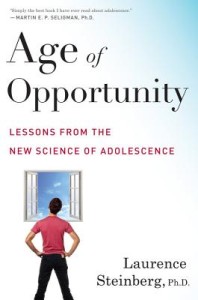Wednesday, October 1, 2014

Laurence Steinberg, professor of psychology at Temple University and author of
Age of Opportunity: Lessons from the New Science of Adolescence, recently wrote an
op-ed piece in the New York Times that looks at the delayed onset of ?adulthood.?According to a large-scale national study conducted since the late 1970s, it has taken longer for each successive generation to finish school, establish financial independence, marry and have children. Today?s 25-year-olds, compared with their parents? generation at the same age, are twice as likely to still be students, only half as likely to be married and 50 percent more likely to be receiving financial assistance from their parents.
Apparently, we don?t know if the end of adolescence is determined by nature, nurture, or some combination. ?Many studies find a marked decline in novelty-seeking as we move through our 20s,? Steinberg notes, ?which may be a
cause of this neurochemical shift, not just a consequence.?
But it?s a passage later in the piece that really piqued my interest.
[T]hose who can prolong adolescence actually have an advantage [because the brain has more ?plasticity?], as long as their environment gives them continued stimulation and increasing challenges.
What do I mean by stimulation and challenges? The most obvious example is higher education, which has been shown to stimulate brain development in ways that simply getting older does not. College attendance pays neural as well as economic dividends.
While higher ed may be the obvious example, those of us working?and learning?in the lifelong learning market know there are other options, arguably better suited to achieving real learning and adapting to the speed of changing knowledge than a college degree: the formal and informal learning offered by trade and professional associations, training companies, certificate programs, and more.
Steinberg?s case for delayed adulthood then is also a case for more learning. Learning that keeps us young.
It seems clear to me that the demand for lifelong learning opportunities will only increase, and higher ed, even if obvious, isn?t the only option. That?s where you and your organization come in.
As for Steinberg?s comments on marriage, I?ll leave you to draw your own conclusions.
Celisa
The post
Importance of Lifelong Learning for Delayed Adulthood appeared first on
Tagoras.
